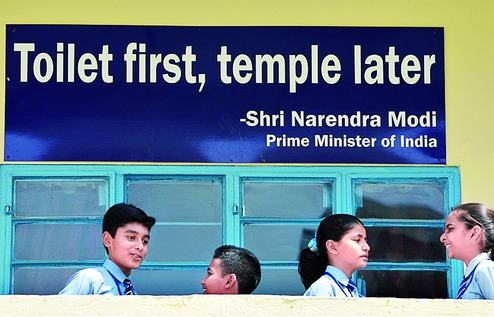
The great scholar, A.L. Basham, who called himself "a friendly mleccha", once accused me of exaggerating the problem of untouchability in one of my regular newspaper columns. He was then head of the Department of Asian Civilization at the Australian National University. Basham demanded that the caste system be viewed in the context of India's culture. "If untouchability persists," he wrote, "it is not due to sinister political forces at work in New Delhi, but because the majority of Indians, despite intense counter-propaganda, want it to persist."
This clash of private preference and public profession is not limited to caste. It involves conflict between tradition and modernity, loyalty and duty, family and State, the persistent past and elusive present. India is at war with itself on multiple fronts. On the one hand is the India that owes much to Jawaharlal Nehru's dream of "a country of quality". Nehru had his lapses on which his critics have fastened, but we owe to his vision the ideal of a modern, rational, industrialized, superstition-free democracy bound by the rule of law and resting on the foundations of science, technology and spiritualism. On the other is an India that is up for grabs by people who are prey to every deadening rite and ritual while their entrepreneurial energy rejects any restrictions imposed by law or competing interest. This India has never been vanquished. It has always flourished under the gloss of modernity. Singaporeans were surprised when the industrialist, Yogendra Mafatlal, visiting Lee Kuan Yew, sprinkled crushed tulsi leaves in his Scotch to sanctify it. But it is now more boldly assertive. The pretence of a "return of the Satyayuga of national greatness" (Sri Aurobindo) allows it to boom as never before.
The alacrity and ingenuity with which Calcutta pedestrians dodged the new drop gates at road crossings as soon as they were installed matched the resourcefulness of operators from Jayanti Dharma Teja to Nirav Modi and Mehul Choksi for whom the self is supreme. Not that opportunism is exclusively Indian. Devi Lal's famous "If I don't promote my own sons, whose sons should I promote - someone else's?" is often cited as the stereotypical exposition of kinship taking precedence over merit. In England, the Gunpowder Plot came a cropper in 1605 because of the warning one of the conspirators is believed to have sent his cousin in the House of Lords whom he wished to spare a horrendous end. The blood is thicker than water axiom rules out the Confucian communitarianism to which Singapore proudly credits its emergence from "a pestilential and immoral cesspool" to become not only one of the richest countries in the world on the basis of per capita income but a squeaky clean one (in all senses) as well.
Today's catch-as-catch-can atmosphere encourages what Nirad C. Chaudhuri called the return to Hindu India, not denigrating the religion but referring to the anarchy that followed the Mughal empire until the East India Company established control. Adityanath's boast that 40 "dreaded criminals" were killed in 1,200 "police encounters", his resolve to continue these encounters, and refusal to countenance outside scrutiny recalled the horror of the Bhagalpur blindings. It was argued then that pouring acid into the eyes of hardened criminals was the only way of dealing with malefactors who took advantage of an inadequate judicial process. The Uttar Pradesh chief minister demonstrates similar contempt for the law enforcement machinery. At least Chhattisgarh's recruitment of tribal youths as Koya Commandos and Salwa Judum (until forbidden by the Supreme Court) was an admitted emergency measure to counter what Manmohan Singh called the "single biggest internal security challenge" India had ever faced. But not even in Bihar in the turmoil of 1979-1980 did any chief minister justify murder by what American Wild West films call "legal guns" as State policy. The Delhi cantonment sign, "Violators will be Shot", under a "No Trespassing" warning outside some innocuous institution betrays the unashamed brutality of the times we live in.
This is hardly the " Sabka saath, sabka vikas" vision that excited the Trump administration. Nor can any Indian regard it as the promised "Achchhe Din", no matter how encouraging the sensex figures might seem. It warns of turbulence boiling under the surface gloss, of violence, greed and cunning barely concealed by snappy slogans like "Digital India" and "Start up India, Stand up India". Nirav Modi and Choksi could not have exploited the Punjab National Bank if nationalized banks had served the nation and not only those who rule the nation. My modest experience of some State Bank of India branches in Calcutta made it clear one needs access to the banking ombudsman to persuade it even to reply to a complaint. Struggling to persuade the bank to correct my long-dead mother's name which they had grotesquely misspelt in their records, I wonder at the inducement (influence?) that must have inspired the PNB's generous letters of undertaking. People don't dream of objecting because the multitude in our hierarchical society takes it for granted that unless you have the clout of an Ambani or an Adani, you must put up with rudeness, callousness and carelessness from those in authority.
It didn't need such a glaring theft to expose the disconnect between practice and precept. Neither Nehru's rationalism nor his daughter's flirtation with the Left succeeded in persuading newspapers not to publish the astrological forecasts that repeated press commissions criticized for dampening the nation's scientific temper. Money looms larger than ever before in this world. Honesty and dishonesty have come to be interpreted only in financial terms. When I expressed doubts about the integrity of a new entrant into the saffron circle, a friend of his solemnly assured me the man didn't take bribes. There was no point trying to explain to him that pretence and posturing, suppressio veri that is the equivalent of suggestio falsi, are just as unethical. His understanding of ethics had been shaped at his grandmother's knee listening to stirring legends of how gods and heroes had pulled a fast one on their adversaries. Cleverness, the ability to outsmart, is what succeeds.
Religion is too closely tied up with material welfare to yield to reason. The relationship between devotees and temples has been described as transactional. Those who give lavishly also entertain lavish expectations from the deity. That goes for any form of giving, even of salutation. The Presidency University vice-chancellor was being utterly candid when she explained her startling public obeisance to Mamata Banerjee by saying she does this version of the pranam to "any older person or anyone of status", particularly mentioning the chancellor and her PhD supervisor. Bosses have to be appeased. This is another transactional relationship. "I am a Marwari," Anuradha Lohia added in further explanation. Indira Gandhi was not. She hated it when people tried to make her a pranam. So did Madhavrao Scindia. Both thought it demeaning.
The crucial question is: which India will win in the end? Narendra Modi began promisingly with his "toilets before temples" commitment. Reports of the demolition of some 200 out of more than 500 unauthorized shrines in Gandhinagar appealed even to voters who have no sympathy for saffron brigade obscurantism. Despite a Gujarat High Court order, the civic authorities apparently lacked the courage to go ahead until the then chief minister took the lead. But the demolitions seem to have stopped in 2008 after a meeting with the late Ashok Singhal, then president of the Vishwa Hindu Parishad, who compared Modi with Mahmud of Ghazni. That was a comparison no populist in need of votes could afford in an overwhelmingly Hindu nation. The survival of self-serving politicians depends on allowing the majority Basham spoke of to shape India's future.










